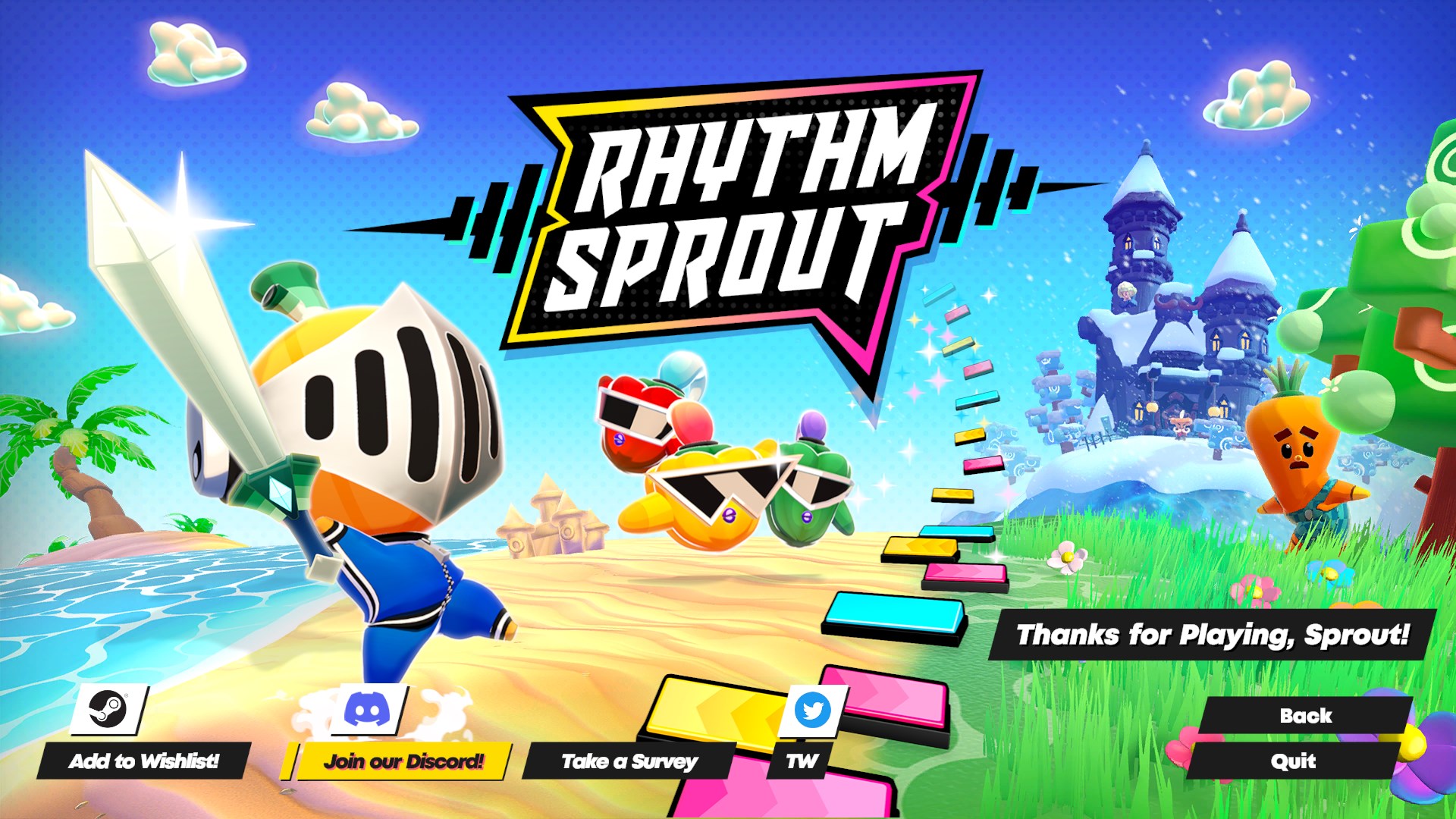Back in PAX East, Rhythm Sprout was one of the main games I previewed on the final day of the expo and it was the one I had the most 'hands-on" experience with at the tinyBuild booth. One of my favorite video game genres is rhythm games. There's just something about hitting buttons to the notes as they appear on the screen to the rhythm of a song. Bonus points if each song is unique and just as catchy as every other song within the playlist. If I can play its music outside of the game itself and listen to it casually, then the game succeeds as a rhythm game in my eyes.
My first impression after playing the PAX demo when I returned home (as it was also on Steam at the time) was a game that showed a lot of promise. It has been a while since I played the old demo, but there were three songs, the final song, Fruitopia, being the "most difficult." For Steam Next Fest, as there are hundreds of games showcased this week alone, I wanted to take a deep dive into Rhythm Sprout as a brand new demo was released for Next Fest itself. Does it improve and build upon its existing formula? A resounding yes.

I considered the old demo more of a very early alpha build that showed the core mechanics of Sprout and the potential songs the games had to offer. Rhythm Sprout is a three-button rhythm game where progression is based on how many notes Sprout, the titular character, "attacks." On the controller, the d-pad attacks "left" and the face buttons attacks "right" while the shoulder buttons are the dodge notes. Traditionally, yellow and pink notes come at left and right lanes respectively, but this isn't always the case. In Mirror mode, the colored notes are in reverse, but the left is still left and the right is still right.
That's one of the newer additions to the demo, modifiers that alter the songs in-game known as EX Mode. Certain modifiers include a "Turbo" mode which plays the entire song in double time, the aforementioned "Mirror" mode, and a "Random" mode that alters the entire chart, making it longer or shorter depending on the seed. The songs that existed in the old demo are also overhauled completely, some adding new melodies and replacing old ones altogether.

The biggest example of this is the demo's first stage, Winter Woods, which is still my favorite song of the songs featured in the demo. A chill lo-fi festive track, the melody is split into three sections, separated by two "battles" in-between. At certain points, the player will come across a "battle" which acts as the song's bridge. Occasionally, the stage boss will attack and the player will need to fight back until the boss is defeated. Another addition is the ability to perform "finishing moves," where mashing the buttons will net a higher score similar to boss encounters in Muse Dash.
Everything is as normal until the third and final section, which is replaced with a brightly upbeat melody that adds a few tricky patterns from the original piece. This is a welcome addition as not only does it keeps the players on their toes, but it also reflects changes according to player feedback. The next stage is the Haunted Mansion, a dub-style track with spooky elements that introduce the "finishing blow" I mentioned earlier. This was another song featured in the original demo that had received a makeover. It was here that I noticed the criteria for getting all three stars have been increased in difficulty, encouraging replayability but also timing and making sure every note counts.

One of the two new stages in the demo, the Mansion Dungeon, is a trap song that coincidentally introduces traps in the game. Much like mines in Dance Dance Revolution, In The Groove, and other physical rhythm games, traps are notes that, when hit, deal bonus damage to Sprout. Sprout actually takes damage this time around and you can fail songs if you're not careful and are caught mashing. The trick to handling the traps is to listen to the rhythm of the song. Even if you sight read, you should gain an idea of when to press a note and when to avoid it.
If the patterns become overwhelming, then there's Sugar Rush mode, a mechanic that acts similarly to Fever mode in DJMAX. In this mode, Sprout's health is restored to maximum, all notes are simplified to a universal input, and the number of points received is increased. This serves two purposes either as a last-ditch effort if you're about to fail out a song or using it during a highly dense pattern to take advantage of the increased scoring. Whatever the purpose is, Sprout can only use this mode once per song, meaning that there's some strategy involved.

Fruitopia is still as frantic of an electro-metal thrash fest as it was in the old demo, with the inclusion of the new trap mechanics to keep players on their toes. The final level of the demo, titled Daddy Club, is different from the others as it behaves more like a "boss rush" mode. You know the scene in movies where the protagonist enters a club, beats all the bosses in the club, and reaches the end of the club to find someone? Like how it's portrayed in Sifu? It's kind of like that. Each "boss" has its own unique genre of music, with patterns more intricate than the next. It was here that Sugar Rush came in handy.
The win condition for each song is when Sprout reaches the end of the stage. In some stages, like the Mansion Basement, it's a "boss battle song" meaning simply getting to the end is enough. In all other stages, there's the regular song, then a boss encounter that ends after a number of hits is dealt to the boss. Then it continues until the end, identified by the moving timeline on the top. As I mentioned before, "attacking" the notes progresses Sprout further towards the goal while Dodging keeps him in place. In courses and Random mode, the Dodge button is implemented in patterns, increasing the number of notes required to make it to the end.

Likewise, missing a note, pressing the wrong note, or getting hit will also halt him in place. There is no "end of the song," but rather "end of the path" and certain sections of the song will play in a loop. This gives Rhythm Sprout a bit of a "roguelite" quality in random mode as your progression is determined by how well you're performing and not necessarily what section of the song you're on. I'm overexplaining the mechanics by a lot, but this means that no two "scores" are the same in EX mode. In Story mode, your timing and how well you mash during finishing blows are among other measures for score tallying.
If I wasn't already excited for Rhythm Sprout before, I am very much so now. To see a game in its early relative infancy growing up to be a fine product of its own with enough changes to improve the title without completely overhauling it shows the effort the developers had made towards their product. The game is slated for an early 2023 release, so there are still months away before we can embark on our Sprout's journey, but it feels like this musical adventure will be a blast.

Rhythm Sprout will release sometime in Early 2023. Players can check out the demo and wishlist the title here.

